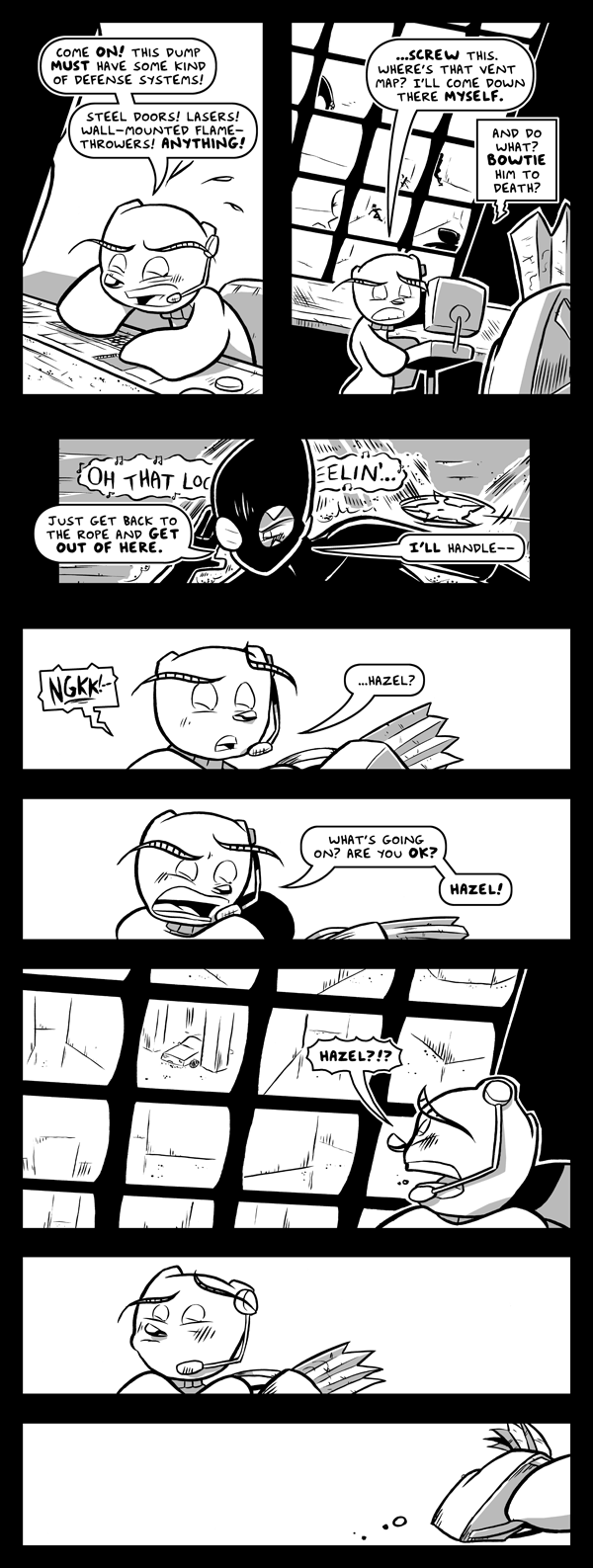Sam and Fuzzy Q & A: 2-bit Edition
Got a question you want answered? Just drop me an email with "Q & A" in the subject line!
"I love how the story fits. Even things that might seem irrelevant or
one-time jokes are part of the arc and there's nothing that goes
unexplained. My question is, did you plan ALL this from the beginning, or
did you make it up as the story progressed? (For example, the possessed fridge that later became a major character and led to volume three.)" -Nicolás
Plan it all? From the beginning? Hoo! I'm sure somewhere there is a cartoonist who plots out their comic more than seven years at a time, but it's definitely not me!
Unlike some cartoonists, I do need to know how a story ends before I start it. Otherwise the end product will be a completely unreadable mess. So, every time I start a new volume of Sam and Fuzzy, I have a rough outline of how it will progress and where it will end.
But still, we're talking about working one volume at a time, here. It's only when the current volume gets about half way through that I start thinking about the next one. In fact, if you ever re-read through Volume 4, I bet you can probably spot the exact place where I first started thinking about the direction of Volume 5!
I hope this answer did not ruin the magic for anyone who thought I was some sort of insane, forward-planning god. Maybe I should have lied. I actually have thorough notes for the next 30 years of comics. Look forward to volume 22, which takes place in space and features a talking coffee maker named Percolating Percy.
"So how far ahead into the story line do you have comics for?" -Taylor
Right this second?
Conceptually, I've figured out all the remaining strips in the "Big Cheat" story, the general plot and some specific strips of the next story, the vague plots of the next two or three after that, and then the big, major story beats of the rest of Volume 5 as a whole.
Physically, I have a bunch of pens and a pile of blank paper.
"In this comic, I feel like you're trying to build some suspense. But by Wednesday, all of that suspense will be gone (for me), despite the fact that right now it's most definitely intense. [But in] a print comic, where I could turn the page in a second rather than wait two days for the next page to be published... I would not be able to put it down if my house were burning to the ground. Do you find this to be a problem for the format you publish in that needs to be worked around to achieve the same effect or do you not pay attention to it?" -Soup
I wouldn't necessarily call it a problem with this publishing format, but it's certainly a reality... not just with webcomics, but with serialized storytelling in general.
You can't just take any old story, chop it up into equal-sized pieces and publish a piece three times a week. Imagine reading an issue of Spider-Man exactly one page at a time, once a day. It would be a mess! The work has to be designed with serialization in mind.
Each installment needs to communicate a complete thought, and evoke some kind of satisfying emotional response from the reader... be it humourous, surprising, upsetting, or terrifying. It also needs to be very carefully paced, keeping the storytelling tight and efficient without sacrificing mood or making the work too dense.
In another format, Hazel and Blank's fight in the collection room might have gone on for pages, but a fight that takes two weeks to read is not very interesting. But on the flip side, I let Hazel's discovery of the dead guards and Mr. Blank spread out over two and a half comics, even though it probably could have been compressed into one, because I felt the shorter version would have been too abrupt and not appropriately tense. The break between strips does undermine the tension a bit sometimes, but I tried to use the first panel of each comic to remind you why you were pumped two days ago.
It's a tricky balancing act, and I'm sure I don't always get it right, but it's definitely something I always keep in mind!
That's all for this week, team. See you on Monday!
-Sam Logan
Discuss on the forum
Jul 10, 2009
Jul 8, 2009
 Swag
Swag
Still crazy busy putting the finishing touches on the new "top secret" items for this year's San Diego Comic-Con. (Although my twitter followers can probably guess what one of those items might be.) Can't wait to have these things finished. It'll be neat to sleep like a normal person again!
-Sam Logan
Jul 6, 2009
 Swag
Swag
Just a quick post tonight! I'm busy, busy, busy getting a few big "top secret" items ready to sell at this year's San Diego Comic-Con. (And here on the website too, of course.) It'll be very exciting when they are done... but it'll be very exhausting until then!
Thanks for all the nice words about the new shirt designs. I do my best!
-Sam Logan
- Bad Machinery
- Boxer Hockey
- Broodhollow
- Clique Refresh
- Dawn of Time
- Dead Winter
- Dinosaur Comics
- Dr McNinja
- Dumbing of Age
- Filibuster
- Gastrophobia
- Gunnerkrigg Court
- Gunshow
- Hijinks Ensue
- Octopus Pie
- Ornery Boy
- Overcompensating
- Questionable Content
- Scenes from a Multiverse
- A Softer World
- Wasted Talent
- Weregeek
- Wondermark









